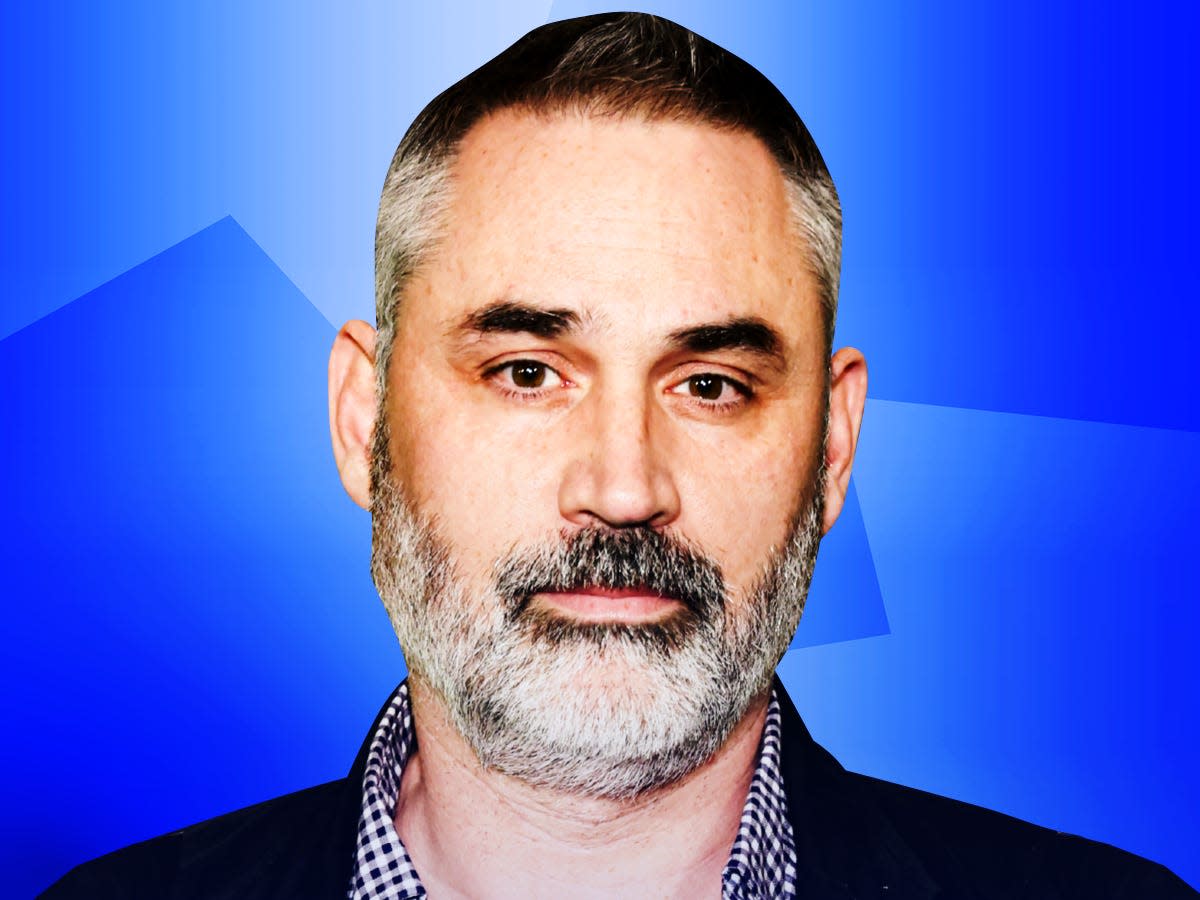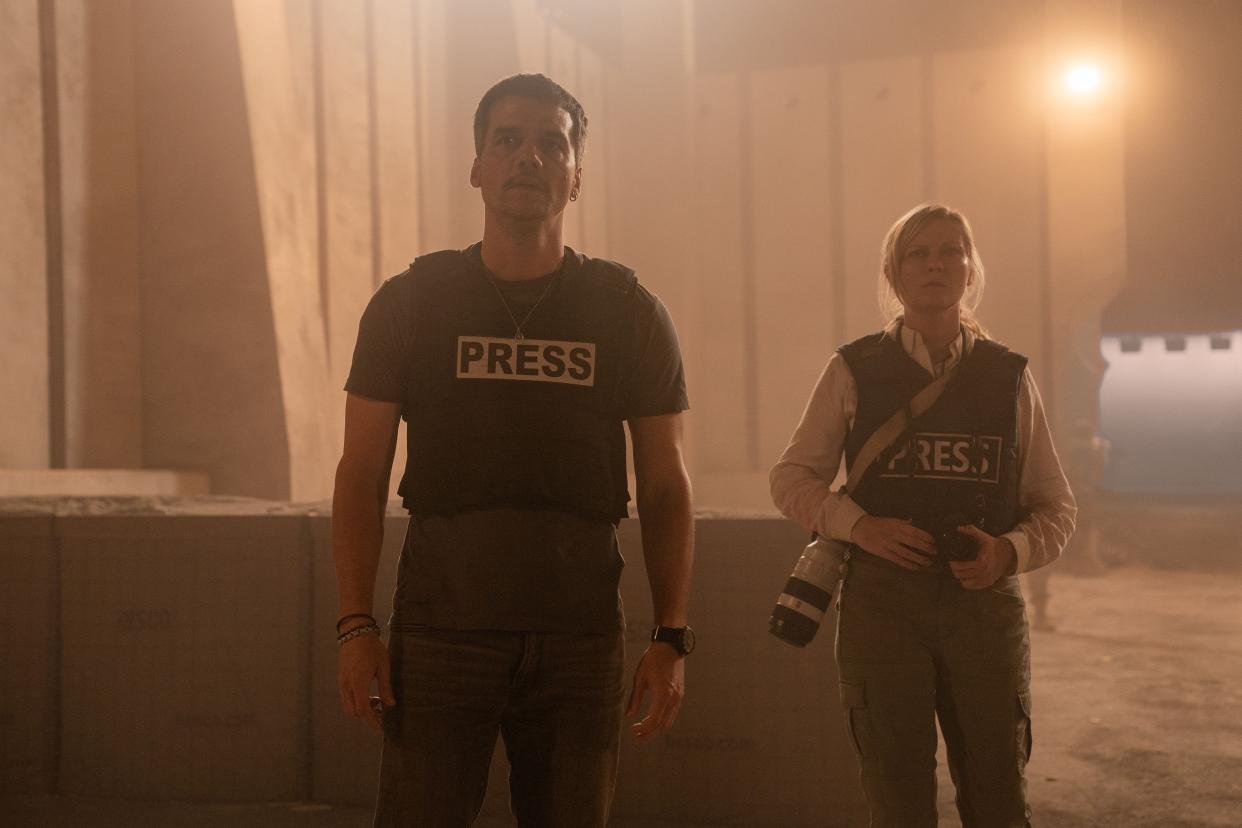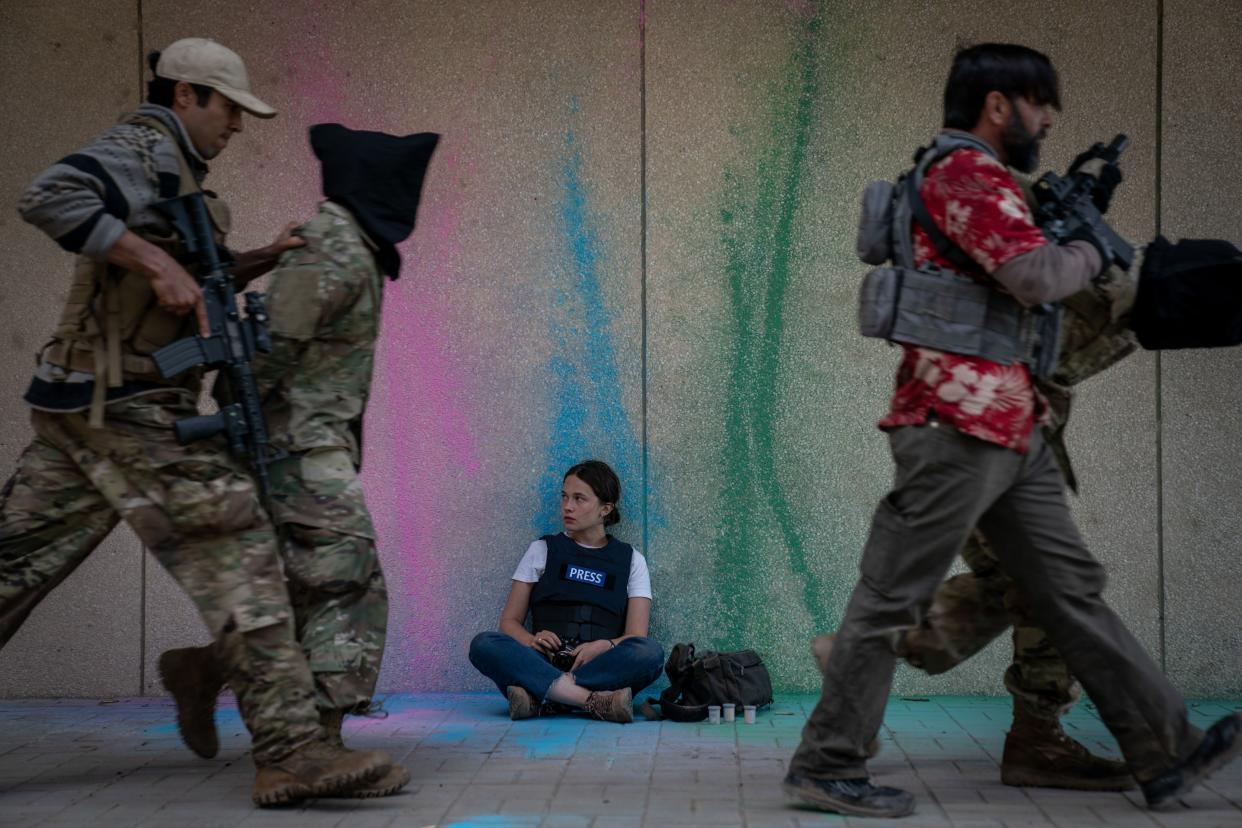'Civil War' is an eerie take on America's future. Both sides of the aisle are mad.

Alex Garland doesn't like being misinterpreted. But the writer-director's latest film, "Civil War," isn't about to spoon-feed its message to audiences, either.
The film, which Garland first started writing in 2020, is an eerily prescient take on the American political landscape. It follows a group of military-embedded journalists, including the hardened war photographer Lee (Kirsten Dunst) and journalist Joel (Wagner Moura), as they travel to Washington, DC, during the final days of a civil war in an attempt to interview the dictatorial third-term president before rebel forces descend on the White House.
It's garnered attention — and criticism — for Garland's decision not to explain the root of the conflict at the heart of the film or the ideologies of the warring factions.
That ambiguity has led some to argue that "Civil War" is devoid of politics, while others applauded the film for refusing to turn either side into an easily digestible ideology the audience can root for or against. Others still have voiced concerns that the film's harrowing sequences of violence, including suicide bombings and people being gunned down by soldiers, could inspire copycats.
It's a vortex of online discourse — but Garland would prefer not to step in and clarify everything.
"Someone could say to me, 'This is an apolitical film.' And I could sit down with them, and I could explain why it's not apolitical," Garland tells BI. "And at the end of it, they'd probably go, 'Okay, yeah, no, I can see it is political.'"
Ultimately, correcting people isn't the point. He wants "Civil War" to make the viewer think, question, and, most importantly, feel.
"I dream of this sort of engaged, interested audience member who does not want everything provided for them in what I feel is a patronizing way," he says.
Below, Business Insider spoke with Garland about the irony and danger of having one's words misinterpreted, and what irritates him most about the film industry.
There's been plenty of conversation around how to interpret the message of "Civil War," but you've also been a bit misinterpreted lately. I know you already clarified this in another interview, but I do want to touch on that weird moment recently where you said you were going to step back from directing, and then everybody freaked out, saying you were "retiring."
Do you have the quote? I said something like, "Step back for the foreseeable future."
All I can say is, is that very ambiguous? Is it either ambiguous in terms of what I mean, or is it contentious? Someone says, "I'm going to stop doing this for a bit" — and then why would anyone care?
It's beyond me. Absolutely beyond me.
You seemed a little annoyed in the response you gave about the backlash to that comment.
Because it's part of a generalized phenomenon of things being grabbed on — the actual meaning of words being ignored in favor of something more reactive and incendiary.
The reason that annoys me is not actually because of myself. It's because of what it does to the tone of public discourse. Because the example with me is so small and so insignificant, it leads nowhere. But sometimes, it does lead somewhere.
I heard Jonathan Glazer's Oscars speech and I did not find it remotely difficult to interpret what it was he was saying. He was making a very considered, actually thoughtful, balanced statement. And then he was treated as if he was encouraging genocide or ignoring genocide when he was doing exactly the opposite. And what I just said would be open to exactly the same kind of misinterpretation.
I would just simply say — and this is a rhetorical question: Is it healthy? And the answer is no, it's not healthy. So does it annoy me? I'm not sure if annoy is the right word. I find it dispiriting and problematic, but I have to say the version that happened to me seems super inconsequential.
It's also kind of — I don't want to say fitting, but interesting in a way that it's happening when you have this film focusing on journalists.
The irony. Not lost on me.
The whole film is, in effect, like that. But with the film itself, that's more understandable. I can see there I have been deliberately opaque, so it requires interpretation by the viewer to parse the meaning out, as it were.
And so there I'd accept, of course, if you do that, if you are opaque in that way, there are going to be some people who say, "This film is devoid of politics."

People have also voiced concerns it could inspire copycat violence.
Sure, which is a really valid question, actually. To really answer it honestly, I would have to be in possession of a whole amount of information that I don't have, and nobody has.
So I can't say I know the answer to the question as stated, but I do know something about what sits opposite it. The consequence of creating silence zones is more familiar and more knowable.
I feel very distrustful of any position which calls for broad silencing. because then you start to ask complex questions about, how deep is the silence? Where are its edges? What are its parameters? How far does it extend? If you silence this thing, doesn't that also by implication mean you have to silence that thing? And there's a contagion in that which is quite rapid.
In general, societies that are big on silencing people, it's not a healthy space to live.
There's also controversy over the decision not to explain the root of the civil war in the film or how California and Texas ended up on the same side. Was there ever a version of the script that either took place earlier in the conflict or one where you explained the origins more directly?
It was always exactly like this. I made a set of assumptions, and I always have a certain kind of audience member in mind, I suppose, that I'm in conversation with.
Obviously, it's a sort of slightly dumb thing to do, because everyone is so varied.
What does that audience member look like who you're talking to? And do you mean broadly with all of your filmmaking or this film in particular?
Broadly, with all of them.
I think, to be honest, it's because I came into the film industry at a time when — this is going to make me sound sort of pious, in a way. I don't mean it this way. I think it's more a reflection of the time I came in.
I came into the film industry at a time when audiences were straightforwardly described in terms that were pretty rude, pretty pejorative, essentially reductively, as if they were incredibly stupid. And you could not make a film that did not fundamentally bend to that stupidity. Not just me, by the way. This was typically fought against by all sorts of different people, and I was just one of the people who found this irksome.
The audience member that I am assuming I'm in communication with I would characterize as being engaged. They're imaginatively engaged in the film. They are thinking, oh, that's a question that's been posed. Why is the question posed like that? Or what are the implications of that question? What could that lead you to think?
But it's also an engagement with the world at large. For example, one of the journalists in "Civil War" says, "Oh no, it's like the race to Berlin." Now, if you know what the race to Berlin is, that immediately gives you actually quite a lot of information about what is happening in this film at this point. Because it means there's more than one force heading towards DC, and that DC is finished. It's not whether DC's going to fight back and win.
So then when the president has been saying, "We've just won a great victory," you know instantly he hasn't won a great victory. He's actually countered what he just said. He's on the verge of defeat.
There'd be one kind of engaged audience that would just know that because they're engaged in history. But there's another kind of engaged audience, who is almost an ideal, who might wonder what that refers to if they didn't know it already and look it up on Wikipedia.

Watching the movie, I felt this sense of removal for the first two-thirds while Kirsten Dunst's Lee was very stoic and also had this sense of detachment from the war happening around her. Then I realized in retrospect that my engagement in the film completely changed when hers did — in that final third where you see her freaking out behind the barricade while they're closing in, I'm freaking out too. Did you want the audience to feel that way, to go through that change?
I'm really glad you said that. The film is attempting to function like a reporter, like an old-fashioned reporter, which is not apolitical, it's just unbiased. There's a huge difference between apolitical and unbiased, and it's also trying to function like the internal space of the reporter.
To me — and this is going to sound very cute, probably because it is cute — the civil war element was both internally contained by Lee, as well as being the context that she's working in. She's having an internal state of civil war, which then goes into its own state of collapse.
Reporters have to hold a kind of distance to stop themselves from screaming or being terrified or running away, but also just in order to report, to just observe and say, "This is the thing that is happening." That is the act of reporting, and that is, in a way, an act of detachment. And then that starts to fail in Lee. And so it starts to fail in the film — fail in a dramatic way.
Your actors have spoken in interviews about the filming process, and how being in this very realistic war zone that you created was almost PTSD-inducing. Were you aware that that was their experience as it was going on, or did you just find out in retrospect?
I was aware.
How did that make you feel as the person in charge?
It's a really good question because it relates to lots and lots of different things. Some of it relates to me as a human being, just as a person communicating, and some of it as someone with a creative goal.
Filmmaking and the history of filmmaking does have an amazing relationship with being cavalier with people's safety. Not just their emotional safety, but their physical safety. I'm aware of all that stuff, and the answer is, even if it's an unsatisfactory answer — you make a judgment call. You think, "I think this is OK. I can see it's not easy, but I think it's OK."
I have been in situations where you suddenly think, "This is not OK," and then you make that judgment call. So that is the honest answer.
Is it possible to make mistakes? Absolutely. I also need to reserve the right to make mistakes in the same way that everybody does, because they're going to make them. It's going to happen.
I'd think about it a lot, and there were times when I would change something that was happening around an actor. I would move them further away from something or remove something that was in close proximity. So it's not that the thing just moves forward like a steamroller, which in the old days would happen a lot. In fact, there was a kind of pride taken in it.
Like treating your actors almost as sort of little toy dolls that you're manipulating?
Not just actors — the crew, everybody. Like there was something inherently noble in the fact that everybody froze to the bones and was right on the verge of hypothermia, and we went six hours over. Like there was a kind of virtue in that.
I don't feel there's a virtue in that. But at the same time, I don't think you can make everything safe. And because the film exists in the same world where not everything can be made safe, then the film is subject to that too.
This interview has been condensed and edited for clarity.
"Civil War" is in theaters now.
Read the original article on Business Insider
